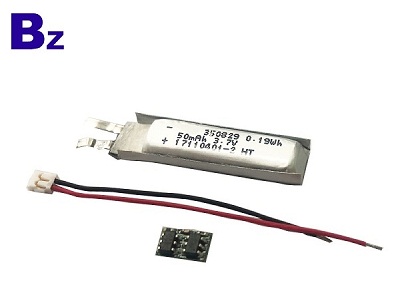The reason why lithium batteries (Rechargeable) need protection is determined by its own characteristics. Since the material of the lithium battery itself determines that it cannot be overcharged, overdischarged, overcurrent, short circuited, and ultrahigh temperature charge and discharge, the lithium battery assembly will always contain an exquisite protection circuit board.

Lithium battery protection function
The protection function of the lithium battery is usually completed by the protection circuit board and the current device such as the PTC. The protection board is composed of electronic circuits, and the voltage of the battery core and the charging and discharging circuit are accurately monitored at -40 ° C to +85 ° C environment. Current, timely control of the current circuit on and off; PTC in the high temperature environment to prevent battery damage.
Ordinary lithium battery protection circuit boards usually include control ICs, MOS switches, resistors, capacitors, and auxiliary devices FUSE, PTC, NTC, ID, memory, and so on. The control IC controls the MOS switch to be turned on under all normal conditions, so that the cell and the external circuit are turned on, and when the cell voltage or the loop current exceeds a prescribed value, it immediately controls the MOS switch to turn off, and protects the cell Safety.
Lithium battery protection board principle
When the protection board is normal, Vdd is high level, Vss, VM is low level, DO and CO are high level. When any parameter of Vdd, Vss, VM is changed, the level of DO or CO will be change has occurred.
1. Overcharge detection voltage: In the normal state, Vdd gradually rises to the voltage between VDD and VSS when the CO terminal changes from a high level to a low level.
2. Overcharge release voltage: In the state of charge, Vdd gradually decreases to the voltage between VDD and VSS when the CO terminal changes from low level to high level.
3. Overdischarge detection voltage: In the normal state, Vdd gradually decreases to the voltage between VDD and VSS when the DO terminal changes from a high level to a low level.
4. Overdischarge release voltage: In the overdischarge state, Vdd gradually rises to the voltage between VDD and VSS when the DO terminal changes from low level to high level.
5. Overcurrent 1 detection voltage: In the normal state, the VM gradually rises to the voltage between VM and VSS when DO changes from high level to low level.
6. Overcurrent 2 detection voltage: In the normal state, the VM rises from OV at a speed of 1 ms or more and 4 ms or less to the voltage between VM and VSS when the DO terminal changes from a high level to a low level.
7. Load short-circuit detection voltage: In the normal state, the VM rises at a speed of 1 μS or more and 50 μS or less from OV to the voltage between VM and VSS when the DO terminal changes from a high level to a low level.
8. Charger detection voltage: In the overdischarge state, the VM gradually drops to OV and the VM-VSS voltage changes from low level to high level.
9. Current consumption during normal operation: In the normal state, the current flowing through the VDD terminal (IDD) is the current consumption during normal operation.
10. Over-discharge current consumption: In the discharge state, the current flowing through the VDD terminal (IDD) is the over-current discharge current consumption.
Typical lithium battery protection circuit
Due to the chemical characteristics of lithium batteries, during normal use, the internal chemical reaction of electrical energy and chemical energy is mutually converted, but under certain conditions, such as overcharging, overdischarging and overcurrent, the internal battery will be caused. Chemical side reactions occur, which will seriously affect the performance and service life of the battery, and may generate a large amount of gas, causing the internal pressure of the battery to rapidly increase and explode, resulting in safety problems. Therefore, all lithium batteries require a protection. The circuit is used for effectively monitoring the charging and discharging states of the battery, and under certain conditions, the charging and discharging circuits are turned off to prevent damage to the battery.


